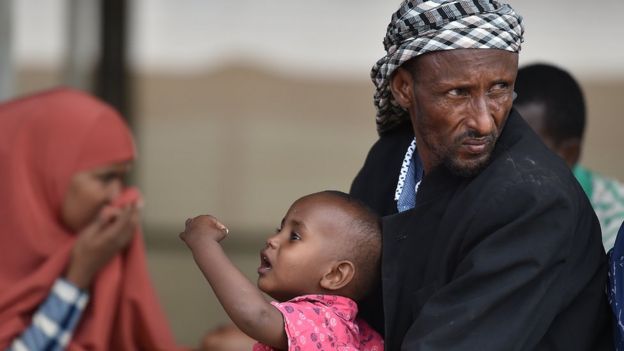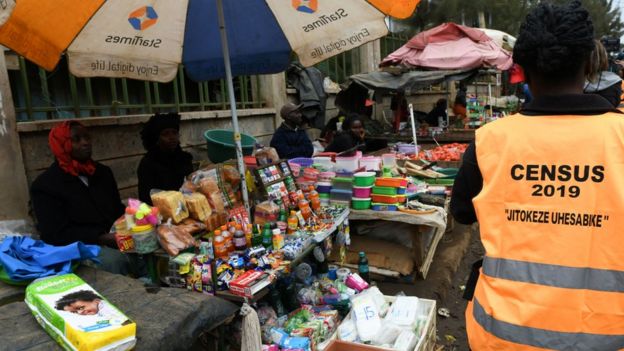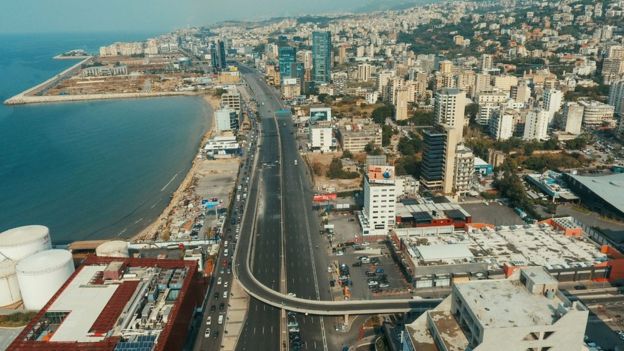Kenya's population census figures have been released, causing controversy among some groups who feel the results are not fair or accurate.
It found that the total population of the country is now 47.6 million, nine million more than in 2009.
But some regions have experienced a decrease in population.
These outcomes can be hugely controversial because the size of the local population has important implications for the level of government funding they receive.
 Image copyrightGETTY IMAGES
This area has a mainly ethnic Somali population.
The figures also reveal a high gender imbalance in the area, with significantly more males than females, leading some to speculate it might be due to a higher incidence of female mortality or an influx of single men who have moved there to work.
"This data, which was released this week, is false and not fit for purpose," says Aden Duale, a politician who represents a constituency with a large Somali population.
He argues that as Somali men normally have more than one wife, you would expect the numbers of women to be higher.
The Kenyan statistics bureau has defended the accuracy of the figures.
Image copyrightGETTY IMAGES
This area has a mainly ethnic Somali population.
The figures also reveal a high gender imbalance in the area, with significantly more males than females, leading some to speculate it might be due to a higher incidence of female mortality or an influx of single men who have moved there to work.
"This data, which was released this week, is false and not fit for purpose," says Aden Duale, a politician who represents a constituency with a large Somali population.
He argues that as Somali men normally have more than one wife, you would expect the numbers of women to be higher.
The Kenyan statistics bureau has defended the accuracy of the figures.
 Image copyrightGETTY IMAGES
Image captionKenya's census is held every 10 years
It's a huge undertaking that involves mapping every home in the country and then visiting them to gather answers to a series of questions.
Some countries are ditching pen and paper for a digital process, in which people fill out a form online.
In Kenya the census is carried out by officials who go door-to-door, recording information on electronic tablets, which send the information to a central database.
Collecting information can sometimes prove difficult. Communities with little trust in their government can be unwilling to reveal personal details.
Image copyrightGETTY IMAGES
Image captionKenya's census is held every 10 years
It's a huge undertaking that involves mapping every home in the country and then visiting them to gather answers to a series of questions.
Some countries are ditching pen and paper for a digital process, in which people fill out a form online.
In Kenya the census is carried out by officials who go door-to-door, recording information on electronic tablets, which send the information to a central database.
Collecting information can sometimes prove difficult. Communities with little trust in their government can be unwilling to reveal personal details.
 Image copyrightGETTY IMAGES
Image captionLebanon hasn't had a full census for decades
The more divided a country, the more contentious a census tends to be.
Ethiopia has postponed its census twice since 2017 because of protests and ethnic violence.
When it does finally happen, the outcome will be significant for groups vying for more regional powers - the larger the ethnic group, the stronger it will feel its claim for self-determination under Ethiopia's ethnically-based federal system.
The Sidama ethnic group in southern Ethiopia, for example, is campaigning to have its own state.
Nigeria has a long history of controversial censuses and was due to hold another one in 2016, but a lack of funds and logistical issues mean it's yet to happen.
And in Lebanon, the quota of representatives in parliament from particular regions is linked to population data in the census.
However, issues of demography there are so controversial there that there hasn't been a full census in Lebanon since 1932.
Image copyrightGETTY IMAGES
Image captionLebanon hasn't had a full census for decades
The more divided a country, the more contentious a census tends to be.
Ethiopia has postponed its census twice since 2017 because of protests and ethnic violence.
When it does finally happen, the outcome will be significant for groups vying for more regional powers - the larger the ethnic group, the stronger it will feel its claim for self-determination under Ethiopia's ethnically-based federal system.
The Sidama ethnic group in southern Ethiopia, for example, is campaigning to have its own state.
Nigeria has a long history of controversial censuses and was due to hold another one in 2016, but a lack of funds and logistical issues mean it's yet to happen.
And in Lebanon, the quota of representatives in parliament from particular regions is linked to population data in the census.
However, issues of demography there are so controversial there that there hasn't been a full census in Lebanon since 1932.
Why does population size matter?
Kenya's population is made up of many different ethnic groups, closely aligned to competing political parties. The government has yet to release all the data on the ethnic composition of the country, but the changes in population in certain regions from this latest census have already caused arguments. The outcome of such surveys can embolden or weaken claims made by groups for political representation or resources. In one area of the north-east territories bordering Ethiopia and Somalia, the census indicates a decrease in the population, prompting local political leaders looking to retain funding for their provinces to question the veracity of the survey. Image copyrightGETTY IMAGES
This area has a mainly ethnic Somali population.
The figures also reveal a high gender imbalance in the area, with significantly more males than females, leading some to speculate it might be due to a higher incidence of female mortality or an influx of single men who have moved there to work.
"This data, which was released this week, is false and not fit for purpose," says Aden Duale, a politician who represents a constituency with a large Somali population.
He argues that as Somali men normally have more than one wife, you would expect the numbers of women to be higher.
The Kenyan statistics bureau has defended the accuracy of the figures.
Image copyrightGETTY IMAGES
This area has a mainly ethnic Somali population.
The figures also reveal a high gender imbalance in the area, with significantly more males than females, leading some to speculate it might be due to a higher incidence of female mortality or an influx of single men who have moved there to work.
"This data, which was released this week, is false and not fit for purpose," says Aden Duale, a politician who represents a constituency with a large Somali population.
He argues that as Somali men normally have more than one wife, you would expect the numbers of women to be higher.
The Kenyan statistics bureau has defended the accuracy of the figures.
What is a census and how does it work?
A census is when a government collects information about its people. This generally includes demographic data such as household population, religion and ethnicity. Censuses are usually carried out every 10 years. Image copyrightGETTY IMAGES
Image captionKenya's census is held every 10 years
It's a huge undertaking that involves mapping every home in the country and then visiting them to gather answers to a series of questions.
Some countries are ditching pen and paper for a digital process, in which people fill out a form online.
In Kenya the census is carried out by officials who go door-to-door, recording information on electronic tablets, which send the information to a central database.
Collecting information can sometimes prove difficult. Communities with little trust in their government can be unwilling to reveal personal details.
Image copyrightGETTY IMAGES
Image captionKenya's census is held every 10 years
It's a huge undertaking that involves mapping every home in the country and then visiting them to gather answers to a series of questions.
Some countries are ditching pen and paper for a digital process, in which people fill out a form online.
In Kenya the census is carried out by officials who go door-to-door, recording information on electronic tablets, which send the information to a central database.
Collecting information can sometimes prove difficult. Communities with little trust in their government can be unwilling to reveal personal details.
How do governments use the information?
The outcome of the census can have a real-world impact on its citizens. In Kenya, not only is the distribution of government funds directly linked to regional population size, it's also the case that constituency boundaries are drawn up using census data. Image copyrightGETTY IMAGES
Image captionLebanon hasn't had a full census for decades
The more divided a country, the more contentious a census tends to be.
Ethiopia has postponed its census twice since 2017 because of protests and ethnic violence.
When it does finally happen, the outcome will be significant for groups vying for more regional powers - the larger the ethnic group, the stronger it will feel its claim for self-determination under Ethiopia's ethnically-based federal system.
The Sidama ethnic group in southern Ethiopia, for example, is campaigning to have its own state.
Nigeria has a long history of controversial censuses and was due to hold another one in 2016, but a lack of funds and logistical issues mean it's yet to happen.
And in Lebanon, the quota of representatives in parliament from particular regions is linked to population data in the census.
However, issues of demography there are so controversial there that there hasn't been a full census in Lebanon since 1932.
Image copyrightGETTY IMAGES
Image captionLebanon hasn't had a full census for decades
The more divided a country, the more contentious a census tends to be.
Ethiopia has postponed its census twice since 2017 because of protests and ethnic violence.
When it does finally happen, the outcome will be significant for groups vying for more regional powers - the larger the ethnic group, the stronger it will feel its claim for self-determination under Ethiopia's ethnically-based federal system.
The Sidama ethnic group in southern Ethiopia, for example, is campaigning to have its own state.
Nigeria has a long history of controversial censuses and was due to hold another one in 2016, but a lack of funds and logistical issues mean it's yet to happen.
And in Lebanon, the quota of representatives in parliament from particular regions is linked to population data in the census.
However, issues of demography there are so controversial there that there hasn't been a full census in Lebanon since 1932.DISCLAIMER: The Views, Comments, Opinions, Contributions and Statements made by Readers and Contributors on this platform do not necessarily represent the views or policy of Multimedia Group Limited.
Latest Stories
-
SHS heads demand payment of outstanding funds before reopening of schools
11 minutes -
We thank God for the 2024 general elections – Akufo-Addo
25 minutes -
Coconut Grove Beach Resort marks 30 years of excellence with memorable 9 lessons & carols service
37 minutes -
WAFU B U-17 Girls’ Cup: Black Maidens beat Nigeria on penalties to win inaugral tournament
1 hour -
Real Madrid beat Sevilla to keep pressure on leaders Atletico
2 hours -
Liverpool put six past Spurs to go four points clear
2 hours -
Manchester United lose 3-0 at home to Bournemouth yet again
2 hours -
CHAN 2024Q: ‘It’s still an open game’ – Didi on Ghana’s draw with Nigeria
3 hours -
CHAN 2024Q: Ghana’s Black Galaxies held by Nigeria in first-leg tie
4 hours -
Dr Nduom hopeful defunct GN bank will be restored under Mahama administration
4 hours -
Bridget Bonnie celebrates NDC Victory, champions hope for women and youth
4 hours -
Shamima Muslim urges youth to lead Ghana’s renewal at 18Plus4NDC anniversary
5 hours -
Akufo-Addo condemns post-election violence, blames NDC
5 hours -
DAMC, Free Food Company, to distribute 10,000 packs of food to street kids
7 hours -
Kwame Boafo Akuffo: Court ruling on re-collation flawed
7 hours

